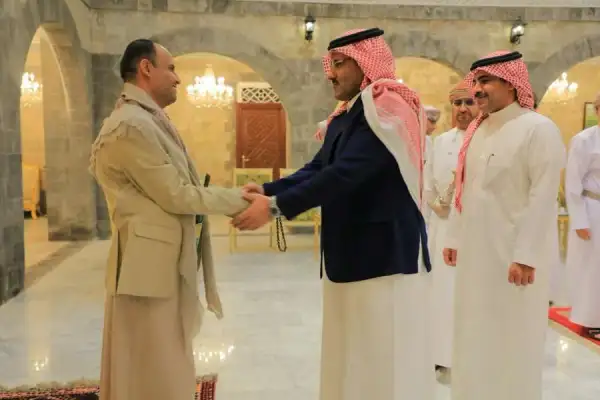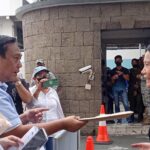
Saudi Arabia ambassador to Yemen, Mohammed bin Saeed al-Jaber, with the head of the Houthis’ Supreme Political Council, Mahdi al-Mashat, in Sanaa. Source: Al-Masirah TV.
On April 14, a Saudi delegation led by the kingdom ambassador to Yemen, Mohammed bin Saeed al-Jaber, concluded a round of peace talks with senior officials from the Houthis (Ansar Allah), including the head of the group’s Supreme Political Council, Mahdi al-Mashat.
The breakthrough peace talks, which began in the Yemeni capital of Sanaa on April 8, were also attended by officials from Oman.
Houthi politburo official Mohammed al-Bukhaiti described the talks as “going well”. Another Houthi official, Abdulmalik Alejri, said on Twitter that “with determination and honest intentions remaining difficulties can be resolved”.
The talks focused on a ceasefire, full reopening of Houthi-controlled ports and Sanaa airport, payment of public sector wages, rebuilding efforts, and the withdrawal of foreign forces from Yemen.
Two Yemeni sources told Reuters that Saudi Arabia and the Houthis could agree on an extended ceasefire deal. The two sides are yet to agree on several points like the payment of civil servant salaries, which the Houthis want to include military personnel, the use of oil revenue and a timeline for foreign forces to withdraw from the country, three other sources familiar with the talks told the news agency.
The conclusion of the talks in Sanaa was followed by an announcement from the International Committee of the Red Cross that the swap of nearly 900 detainees by Saudi Arabia and the Houthis had started.
Saudi Arabia led a large Arab coalition into Yemen in 2015 to overthrow the Houthis, who took over the country the prior year. According to the United Nations, the war has so far claimed the lives of more than 370,000 people.
Earlier this month, several reports revealed that the kingdom made the decision to end the war in the country and help broker an intra-Yemeni peace agreement. Riyadh’s decision was a direct result of the recent rapprochement with Tehran, the main ally of the Houthis.
MORE ON THIS TOPIC:



